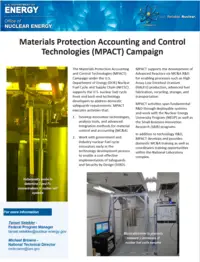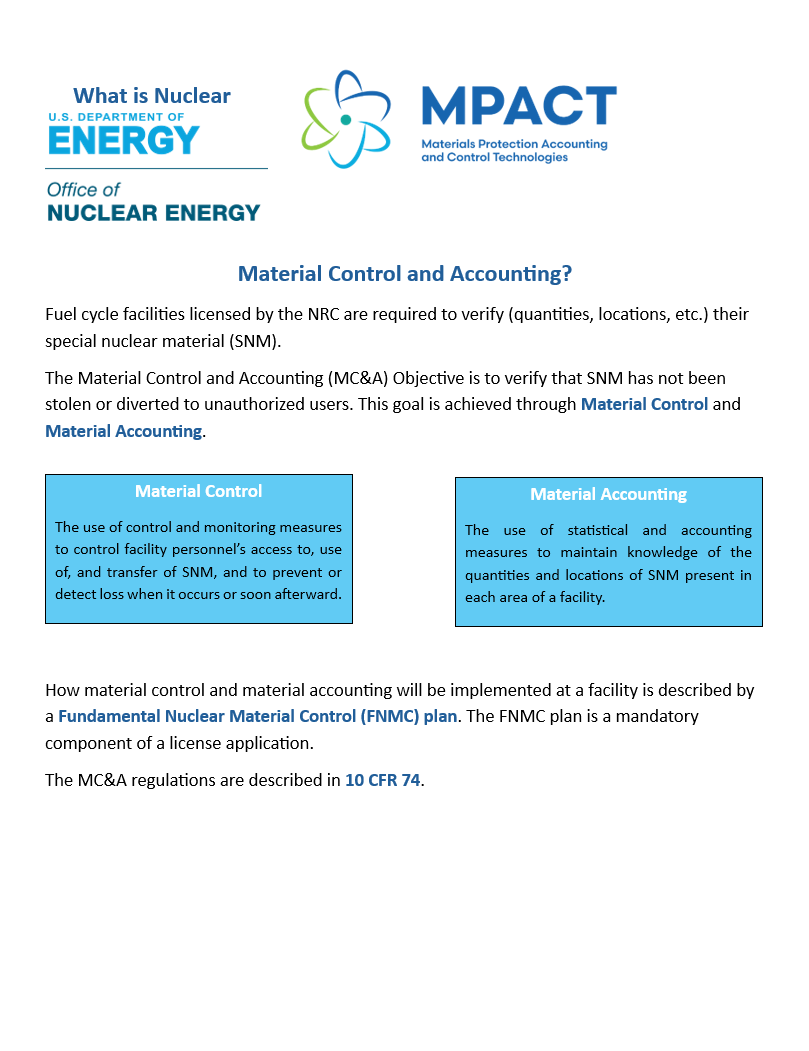MPACT Overview
The Department of Energy, Office of Nuclear Energy (NE) initiated the MPACT program in 2010 to develop Material Control and Accounting (MC&A) technologies supporting the civil use of nuclear energy in the United States. The MPACT program is under the Office of Materials and Chemical Technologies (NE-43).
The MPACT mission is to support the U.S. nuclear fuel cycle front and back-end technology developers to effectively and economically address domestic safeguards requirements at facilities regulated by the NRC (NRC) by:
- Developing innovative technologies, analysis tools, and advanced integration methods for nuclear material control and accounting (MC&A)
- Engaging with government and industry stakeholders early in the technology development process to enable a cost-effective implementation of Safeguards and Security by Design (SSBD)
- Supporting the development of Advanced Reactors via MC&A support for enabling processes such as High Assay Low Enriched Uranium (HALEU) and advanced fuel fabrication, storage, and transportation
- Working with the U.S. National Laboratories, U.S. nuclear industry, and U.S. universities through directly funded R&D programs, the Nuclear Energy University Program (NEUP) Funding Opportunity Announcement (FOA) , and the Small Business Innovation Research (SBIR)/Small Business Technology Transfer (STTR) programs
MPACT general topical areas of interest include:
- Front-End Domestic Safeguards Activities
- Back-End Domestic Safeguards Activities
- Fuel Cycle Domestic Safeguards Education Activities
The Office of Materials and Chemical Technologies (NE-43)
- Focuses on developing advanced fuel cycle technologies and addressing fundamental materials separation and recovery challenges that have the potential to improve resource utilization, reduce waste generation, and limit proliferation risk
- Supports the development and demonstration of different recycling technologies to make available small quantities of HALEU materials for advanced reactor fuel-fabrication R&D needs
- Develops advanced technologies for the immobilization of waste, including off-gas for aqueous and molten salt recycling processes
- Provides unique nuclear chemistry expertise and technical capabilities to a broad range of civil nuclear applications
- Develops innovative technologies, analysis tools, and advanced integration methods to enable U.S. domestic nuclear materials management and safeguards for emerging nuclear fuel cycles to effectively and economically address nuclear materials control and accounting (MC&A) requirements
- NE-43 materials research includes compatibility issues with various coolants, irradiation damage, structural integrity in corrosive, high temperature and high-pressure environments, high temperature design methodologies, and computer modeling of irradiation effects
-
There are two main programs under NE-43:
- Fuel Cycle Core R&D
- Materials Recovery and Waste Form Development (MRWFD)
-
Fuel Cycle Core R&D
- Materials Protection, Accounting, and Control Technologies (MPACT)
- Innovative Process Controls and Salt Fuel Capabilities (IPC)
- Innovative Nuclear Materials (INM)


